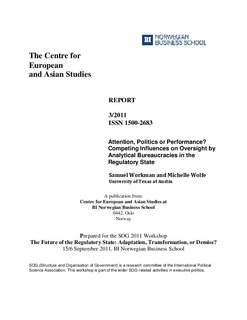Attention, Politics or Performance? Competing Influences on Oversight by Analytical Bureaucracies in the Regulatory State
Abstract
In this paper, we examine and evaluate competing explanations for congressional attention
to the federal bureaucracy in the United States. What we label “analytical bureaucracy” is a
key, but severely understudied, tool in congressional management of administrative
policymaking. Congressional attention to the bureaucracy generally, as well as particular
agencies, is governed by a confluence of factors. These explanations involve the partisan
and ideological features of the American political system, issue-driven attention through
time, and bureaucratic performance. Using a new data set of reports issued by the
Government Accountability Office (GAO) over the past quarter century, we examine the
influence of partisan politics and governmental performance on congressional attention to
the federal bureaucracy. Using the new GAO data as the focus of the analysis, we
demonstrate variation in these data pursuant to common measures of ideology in Congress
and the bureaucracy and measures of bureaucratic and programmatic performance. Using
these data as the focus of study, we demonstrate that the strength of these different
explanations varies both across time and particular partisan configurations of American
government. Our findings have implications for how we understand the dynamics of
congressional intervention in administrative processes, and further how we view the role of
congressional bureaucracies in administrative policymaking.
